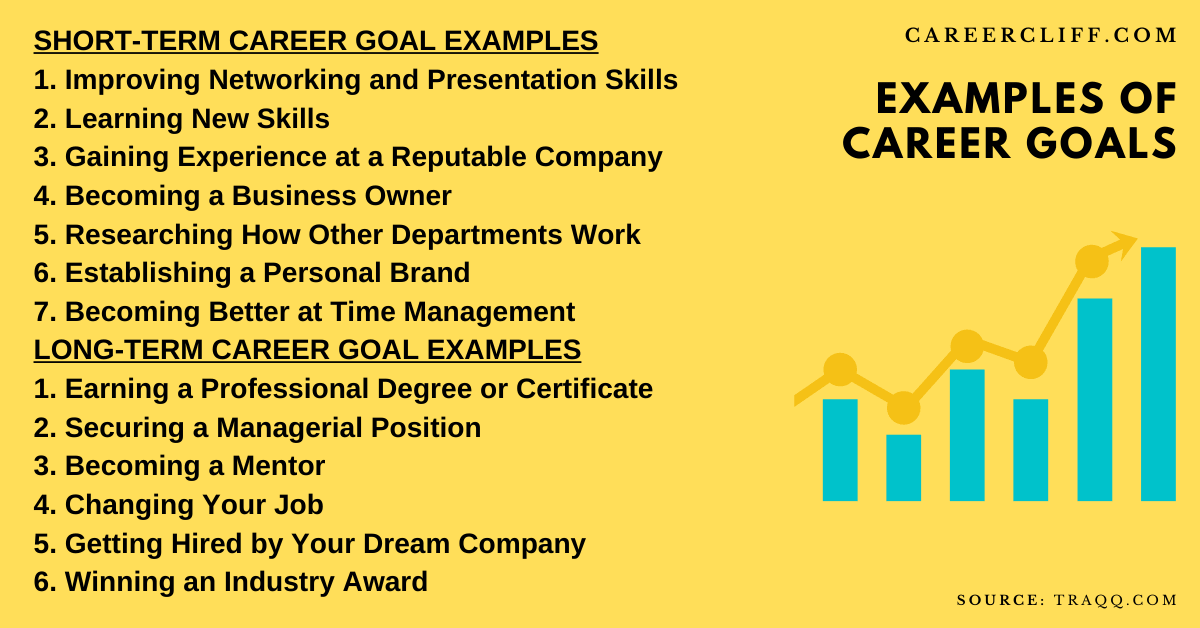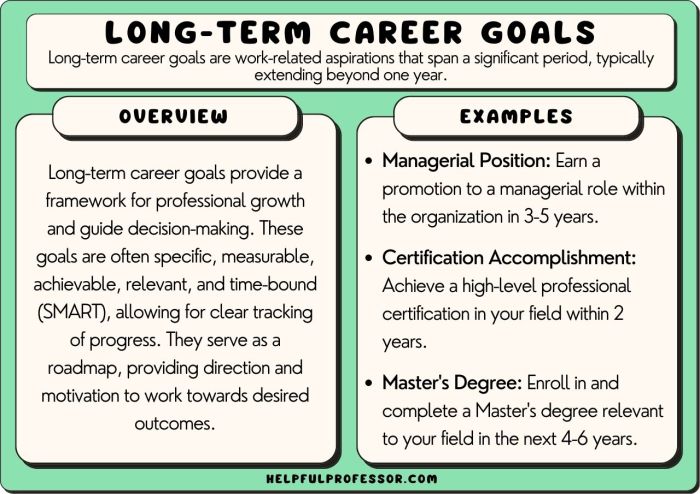Career Development Goals are like the GPS to your dream job – guiding you through the twists and turns of professional growth with swag and purpose. Get ready to level up your career game!
Whether you’re aiming for that corner office or looking to master a new skill, setting clear career development goals is key to unlocking your full potential. Dive into the world of career aspirations and let’s hit those goals together.
Importance of Career Development Goals
Setting clear career development goals is crucial for professional growth as it provides a roadmap for individuals to follow in order to advance in their careers. Without clear goals, it can be easy to lose focus and direction, hindering progress and growth.
Career development goals help individuals stay focused and motivated by giving them something to strive for. When goals are clearly defined, individuals are more likely to stay on track and work towards achieving them. This sense of purpose can increase motivation and drive to succeed in their chosen field.
Achieving career development goals can lead to increased job satisfaction as individuals see the results of their hard work paying off. Whether it’s gaining a promotion, learning a new skill, or reaching a milestone, accomplishing these goals can bring a sense of fulfillment and pride in one’s work.
Types of Career Development Goals

When it comes to career development goals, there are various categories to consider. These categories include skills-based goals, promotion-based goals, and education-based goals. Each type of goal plays a crucial role in shaping an individual’s career path and overall professional growth.
Short-term vs. Long-term Career Development Goals
Short-term career development goals are focused on achieving objectives within a relatively brief timeframe, typically ranging from a few months to a year. These goals are essential for making immediate progress and building momentum in one’s career. On the other hand, long-term career development goals encompass broader aspirations that may take several years to accomplish. These goals provide a strategic roadmap for long-lasting career success.
Examples of SMART Career Development Goals
- Enhance communication skills by attending a public speaking workshop once a month for the next six months to improve presentation abilities and build confidence.
- Obtain a project management certification within the next year to increase job prospects and qualify for leadership positions within the organization.
- Complete a master’s degree in Business Administration within the next three years to advance to a senior management role and expand knowledge in the field.
Strategies for Setting Career Development Goals

Setting effective career development goals is crucial for professional growth and success. Here is a step-by-step process to help you establish meaningful goals and work towards achieving them.
Aligning Career Development Goals with Personal Values and Interests
When setting career development goals, it’s essential to align them with your personal values and interests. Take some time to reflect on what matters most to you in your career. Consider what motivates you, what brings you fulfillment, and what you are passionate about. By connecting your goals to your values and interests, you are more likely to stay committed and inspired throughout the journey.
- Identify your core values and interests: Reflect on what truly matters to you in your career and what you are passionate about.
- Set goals that resonate with your values: Ensure that your career development goals align with your core values and interests to maintain motivation and drive.
- Regularly assess alignment: Continuously evaluate whether your goals still align with your values and interests, making adjustments as needed.
Importance of Seeking Feedback and Revising Goals as Necessary
Seeking feedback and revising goals are vital components of the goal-setting process. Feedback provides valuable insights and perspectives that can help you refine your goals and approach. Additionally, revising goals allows you to adapt to changing circumstances and priorities, ensuring that your goals remain relevant and achievable.
- Solicit feedback from mentors and peers: Gather feedback from trusted individuals who can offer constructive criticism and guidance.
- Reflect on feedback and make adjustments: Take the feedback you receive into consideration and make necessary revisions to your goals to enhance their effectiveness.
- Regularly review and revise goals: Continuously assess your progress towards your goals and make adjustments as needed to stay on track and maximize your success.
Overcoming Challenges in Achieving Career Development Goals
Achieving career development goals can be a challenging process, as individuals may face various obstacles along the way. It is important to be aware of these challenges and have strategies in place to overcome them to stay motivated and focused on reaching your goals.
Common Obstacles in Achieving Career Development Goals
- Lack of resources or support: Sometimes individuals may not have access to the necessary resources or support system to help them achieve their career development goals.
- Fear of failure: The fear of not succeeding or making mistakes can hold individuals back from taking risks and pursuing their goals.
- External factors: External factors such as economic conditions, market trends, or unexpected life events can impact the progress towards career development goals.
Strategies for Overcoming Setbacks and Staying Motivated
- Set small, achievable milestones: Break down your larger career goals into smaller, manageable tasks to track progress and stay motivated.
- Seek feedback and guidance: Reach out to mentors, career coaches, or trusted colleagues for advice and feedback to help you navigate challenges and setbacks.
- Practice self-care: Prioritize your physical and mental well-being to stay resilient and maintain motivation during challenging times.
Role of Resilience and Adaptability
Resilience and adaptability play a crucial role in overcoming challenges related to career development goals. Being resilient allows individuals to bounce back from setbacks, learn from failures, and stay focused on their goals. Adaptability helps individuals navigate changing circumstances, adjust their strategies, and remain flexible in pursuing their career development goals.